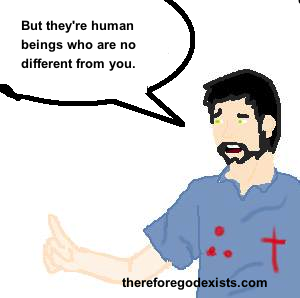 If I wanted to illustrate that the government sometimes dictated laws that were patently immoral, one of the most obvious examples that I could appeal to are those with racist overtones. If a law presupposes that a person with a particular pigmentation is morally inferior to another, then this is an immoral law. The abomination of slavery in the American south would be the obvious instance that one would appeal to. We need not convoke moral monsters such as Adolph Hitler to establish this point. We need only look to our own founding fathers and our European ancestors that invaded what we now call the United States. Of course, many of these men were Christians and believed the Bible. There are even renowned Christians from generations passed who owned slaves, such as the Puritan and father of evangelicalism, Jonathan Edwards. Is this a sign that the Bible teaches slavery? While it is certainly disgraceful, even Christians can be taken in by the tides of the world and fail to embrace or understand the biblical case against racism.
If I wanted to illustrate that the government sometimes dictated laws that were patently immoral, one of the most obvious examples that I could appeal to are those with racist overtones. If a law presupposes that a person with a particular pigmentation is morally inferior to another, then this is an immoral law. The abomination of slavery in the American south would be the obvious instance that one would appeal to. We need not convoke moral monsters such as Adolph Hitler to establish this point. We need only look to our own founding fathers and our European ancestors that invaded what we now call the United States. Of course, many of these men were Christians and believed the Bible. There are even renowned Christians from generations passed who owned slaves, such as the Puritan and father of evangelicalism, Jonathan Edwards. Is this a sign that the Bible teaches slavery? While it is certainly disgraceful, even Christians can be taken in by the tides of the world and fail to embrace or understand the biblical case against racism.
 I would like to suggest that the intellectual case for racism is often shallow and rests upon a foundation of rage and pride. People may have seen members of their family brought to harm by a particular minority group or they may have just been raised in a home with racist parents and so have an inkling of racism in the recesses of their mind. But if somebody were to attempt to make an intellectual case for racism, serious examination would find it wanting. If I am permitted to take the Bible as my authority (as many racists do, ironically!) racism would be forced to recede into the halls of intellectually unviable anthropological models. The biblical case against racism that I outline in this article should cripple racist thought that may impose itself upon Christians.
I would like to suggest that the intellectual case for racism is often shallow and rests upon a foundation of rage and pride. People may have seen members of their family brought to harm by a particular minority group or they may have just been raised in a home with racist parents and so have an inkling of racism in the recesses of their mind. But if somebody were to attempt to make an intellectual case for racism, serious examination would find it wanting. If I am permitted to take the Bible as my authority (as many racists do, ironically!) racism would be forced to recede into the halls of intellectually unviable anthropological models. The biblical case against racism that I outline in this article should cripple racist thought that may impose itself upon Christians.
 The Image of God And Intrinsic Moral Value. Christians usually take the doctrine of the imago dei or the image of God to reflect something special that is in human beings that is not in the rest of the animal kingdom. We are distinct from lower animals because we are made in the image of God. We have an intrinsic value that is not present in lower animals. That is why it is acceptable (though not preferable) to run over a squirrel but not to run over a human. That is why it is acceptable to kill your dog to feed your starving child, but not acceptable to kill your child to feed your starving dog. Human beings have intrinsic moral value that is just not present in the animal kingdom. Since this is a biblical argument, I am assuming the authority of the Bible, assuming that this is true, and so, will not defend the doctrine of the imago dei against secular attacks. We may assume, as the Declaration of Independence says, “We hold these truths to be self-evident, that all men are created equal, and are endowed by their Creator with certain inalienable rights, among them, life, liberty, and the pursuit of happiness.”
The Image of God And Intrinsic Moral Value. Christians usually take the doctrine of the imago dei or the image of God to reflect something special that is in human beings that is not in the rest of the animal kingdom. We are distinct from lower animals because we are made in the image of God. We have an intrinsic value that is not present in lower animals. That is why it is acceptable (though not preferable) to run over a squirrel but not to run over a human. That is why it is acceptable to kill your dog to feed your starving child, but not acceptable to kill your child to feed your starving dog. Human beings have intrinsic moral value that is just not present in the animal kingdom. Since this is a biblical argument, I am assuming the authority of the Bible, assuming that this is true, and so, will not defend the doctrine of the imago dei against secular attacks. We may assume, as the Declaration of Independence says, “We hold these truths to be self-evident, that all men are created equal, and are endowed by their Creator with certain inalienable rights, among them, life, liberty, and the pursuit of happiness.”
 This means that human beings are imbued with intrinsic moral worth. When I say intrinsic moral worth, I mean that in and of themselves, human beings have value. By virtue of being a human being, they have value, and as such, it is wrong to persecute them, to use them as means to an end, and to obstruct their rights to life, liberty, and the pursuit of happiness. All men possess these intrinsic right. If one were to remove this property of intrinsic moral value, one would have something that was sub-human. But by virtue of being a biological human being, one has intrinsic value. This is to be contrasted against extrinsic or circumstantial value. One has circumstantial value when only in certain circumstances, a person has value. A worthless man may pretend that he loves a woman just to exploit her sexual function. He regards her value as being circumstantial. But since she has intrinsic value, and he is treating her as if she does not, he has committed a misdeed. However, if by virtue of being a human being, one possesses intrinsic moral value, it follows necessarily that people with a different pigmentation also possess intrinsic moral value.
This means that human beings are imbued with intrinsic moral worth. When I say intrinsic moral worth, I mean that in and of themselves, human beings have value. By virtue of being a human being, they have value, and as such, it is wrong to persecute them, to use them as means to an end, and to obstruct their rights to life, liberty, and the pursuit of happiness. All men possess these intrinsic right. If one were to remove this property of intrinsic moral value, one would have something that was sub-human. But by virtue of being a biological human being, one has intrinsic value. This is to be contrasted against extrinsic or circumstantial value. One has circumstantial value when only in certain circumstances, a person has value. A worthless man may pretend that he loves a woman just to exploit her sexual function. He regards her value as being circumstantial. But since she has intrinsic value, and he is treating her as if she does not, he has committed a misdeed. However, if by virtue of being a human being, one possesses intrinsic moral value, it follows necessarily that people with a different pigmentation also possess intrinsic moral value.
 Evil people have been presented this line of argumentation and have opted to suggest that while these people of a different pigmentation are biological human beings, they are not human persons. It is being a person, not a biological human being, that warrants intrinsic moral value. The question is, what constitutes personhood? How does define what a person is? The only answer that is forthcoming is that this individual has the same pigmentation as you do. Well, how convenient. But what good reasons are there to think that? It seems to me to be ad hoc, which is to say that it is an objection that is specifically designed the circumvent the argument. Second, pigmentation is an extrinsic property. It is based on circumstance and ancestry. If one were to say that intrinsic human value is contingent upon a particular pigmentation, they are positing a model of extrinsic and circumstantial human value. For if basic human value is contingent upon an extrinsic property, then it seems to flow nicely to the conclusion that human value is, itself, an extrinsic property, hence undermining the doctrine of the image of God. The biblical case against racism, then, is that the doctrine of the image of God uproots the doctrines of racism.
Evil people have been presented this line of argumentation and have opted to suggest that while these people of a different pigmentation are biological human beings, they are not human persons. It is being a person, not a biological human being, that warrants intrinsic moral value. The question is, what constitutes personhood? How does define what a person is? The only answer that is forthcoming is that this individual has the same pigmentation as you do. Well, how convenient. But what good reasons are there to think that? It seems to me to be ad hoc, which is to say that it is an objection that is specifically designed the circumvent the argument. Second, pigmentation is an extrinsic property. It is based on circumstance and ancestry. If one were to say that intrinsic human value is contingent upon a particular pigmentation, they are positing a model of extrinsic and circumstantial human value. For if basic human value is contingent upon an extrinsic property, then it seems to flow nicely to the conclusion that human value is, itself, an extrinsic property, hence undermining the doctrine of the image of God. The biblical case against racism, then, is that the doctrine of the image of God uproots the doctrines of racism.
 “There is neither Jew nor Greek, there is neither slave nor free man, there is neither male nor female; for you are all one in Christ Jesus.” Galatians 3:28 In the book of Galatians, Paul is responding to a group of Judaizers who have invaded the church in Galatia. They wanted to impose old Jewish rites upon the Gentile men, insisting that they get circumcised. Of course, Paul does not care about performing Jewish rites (Acts 16:5, Romans 14), but he does not care about it when one says that Gentiles must do it as a prerequisite to salvation. Either way, among the strong language that Paul used against the Judaizers, he told this church in Galatia that there is neither Jew nor Greek, for we all one in Christ. This is to say that the covenantal relationship that God had with the Jews had been extended to include Gentiles. Anybody who has the faith of Abraham is therefore a child of promise. It is not a matter of ones’ genealogy, but a matter of the faith of Abraham. If one has the faith of Abraham, you are unified with Christ and his body – one in Christ.
“There is neither Jew nor Greek, there is neither slave nor free man, there is neither male nor female; for you are all one in Christ Jesus.” Galatians 3:28 In the book of Galatians, Paul is responding to a group of Judaizers who have invaded the church in Galatia. They wanted to impose old Jewish rites upon the Gentile men, insisting that they get circumcised. Of course, Paul does not care about performing Jewish rites (Acts 16:5, Romans 14), but he does not care about it when one says that Gentiles must do it as a prerequisite to salvation. Either way, among the strong language that Paul used against the Judaizers, he told this church in Galatia that there is neither Jew nor Greek, for we all one in Christ. This is to say that the covenantal relationship that God had with the Jews had been extended to include Gentiles. Anybody who has the faith of Abraham is therefore a child of promise. It is not a matter of ones’ genealogy, but a matter of the faith of Abraham. If one has the faith of Abraham, you are unified with Christ and his body – one in Christ.
An identical line of reasoning could be applied to people of different pigmentations. There is nothing to separate whites from blacks or any other pigmentation. There is nothing unifying whites together that would exclude blacks from that unity and there is nothing unifying blacks together that would exclude whites from that unity. I truly find it frustrating to hear people of a particular pigmentation referring to each other as “brother” by virtue of their pigmentation. That seems to play into the racist paradigm. Followers of Christ are unified and these distinctions do not matter anymore. I am persuaded, as should you be, for the reasoning is identical, that if Paul were writing to a modern racist, he would say, “There is neither white, nor black, for we are all one in Christ Jesus.” The biblical case against racism is that Paul thought that our ethnicity was not what unified us. What unifies us is that we share the faith of Abraham – faith in Jesus Christ. That unifies us and other distinctions fade into irrelevancy.
The old prophecies foresaw a unification of all nations. There is certainly an undeniable element of nationalistic pride throughout the Old Testament. The ethnic Jews were God’s people, in a covenantal relationship with God. But that is not to say that God hated the people of the other nations. People were not thought of as subhuman parasites (though extra-biblical sources sometimes make this sort of assertion). Rather, the Old Testament posits that there will be a unification of all nations. As Isaiah 49:6 says, “It is too small a thing that You should be My Servant to raise up the tribes of Jacob and to restore the preserved ones of Israel; I will also make you a light of the nations, so that my salvation may reach to the end of the earth.” (This is one of the most significant fulfilled prophecies in the Bible. For just look around the world. All nations have come to believe in the God of Israel.)
This theme of worldwide unification was resisted by the nationalistic pride of God’s people. The semi-racist inclinations would impose themselves. But God would remind his people of this glorious truth. In the book of Jonah, the prophet is called to preach to the people of Ninevah – Gentiles, outside of the covenant of God. Jonah is resistant, but God’s will swallows him whole. The book of Jonah serves as a refutation of the hypothesis that the Old Testament portrays a tribal deity who cares naught for the rest of the world. The God of Israel cares for the Gentiles. That is why we see Gentiles such as Job, Melchizedek, the people of Ninevah, et cetera. The biblical case against racism is that the old prophecies reveal that God cares for these people. He cares for all nations.
Love your enemies. The moral commands that Jesus Christ gave often prove destructive to worldly ethics. People who want to live a bigoted and hateful life must ignore certain things that Jesus Christ said. His message was profound and simple. In the clearest way, he told men things that they already knew, convicting them of the knowledge of sin that they have been suppressing. You may think that you are living morally perfect, argues Jesus, but you are not (Mark 10:17-22). Everything that you do comes forth from a corrupt heart (Luke 6:45). The perfect standard of morality that is reflected in the person of Jesus Christ is still potent, for the word of God is alive and powerful (Hebrews 4:12). It sends not ripples but waves to crash into the boat of bigotry. Anybody with an inkling of a racist thought is confronted by the words of Jesus Christ, not only because he declared of a Gentile that he had greater faith than that encountered in Israel (Luke 7:9), and not only because he told parables indicating that all of the nations will be invited to the great banquet (Luke 14:15-24), but because he called men to love their enemies.
He said in Matthew 5:43-44, “You have heard that it was said, ‘You shall love your neighbor and hate your enemy.’ But I say to you, love your enemies and pray for those who persecute you.” People of different pigmentation are not our enemies. But if, for the sake of argument, we say that they were, what are the marching orders? What is our command? How should we treat even the unbelieving world and how should we regard those who are different from us? Jesus tells us to love them, to love our enemies. Does this not presuppose that they have some sort of intrinsic human value? Similarly, Jesus says that Christians are to love one another (John 13:34), and in this way, people will know that we are followers of Christ. If our brothers in Christ are of a different pigmentation, we are called to love them. If a worldly person is of a different pigmentation, we are called to love them, whether they are our enemy, whether they are persecuting us. People like to talk about how evil people of different pigmentations are and all of the purported nefarious acts. They persecute people, hurt people, et cetera. How should we react to these people? Jesus Christ tells us, “Love your enemies and pray for those who persecute you.” The biblical case against racism and the words of Jesus of Nazareth have proven destructive to racism.
If you would like to get in on the discussion about this, join my Theology Discussion Group!